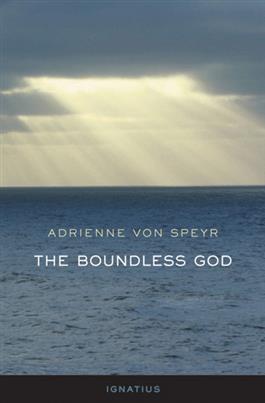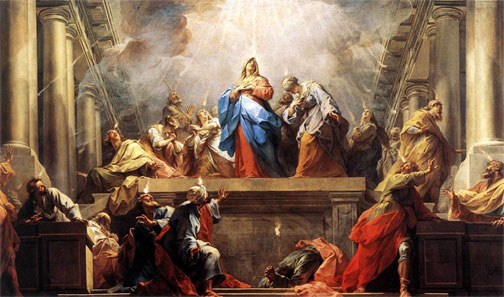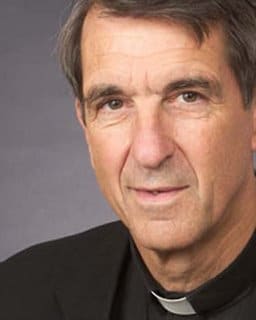Podcast: Play in new window | Download (Duration: 9:17 — 6.4MB) | Embed
Subscribe: Apple Podcasts | Spotify | Amazon Music | Android | Pandora | iHeartRadio | JioSaavn | Podchaser | Gaana | Podcast Index | Email | TuneIn | Deezer | Anghami | RSS | More
A. The “para” as the the essence of man’s sanctity
“Man is created in order to…” this is most appropriately the definition of man and even more that of the saint. In this “para,” man ought to give testimony to the actual essence of his sanctity, to appropriate the “para” as his nature.
Ignatian
B. “Praise, reverence, and service”
Why are they listed in this order? Praise comes first in order to emphasize the moment of joy. Reverence comes forth from joy and gives it the necessary distance, the correct measure. Service grows out of joy and distance. To be allowed to praise out of joyful love, the distance of reverence absolutely must grow, otherwise the one praising would become unbearable to the one being praised. He would be pushy, annoying, and tedious with his continual praise. Therefore, love itself demands one step back. Only then will one see what about the beloved love has to praise. This free realm between both is required; otherwise, the love will choke. Thus, the right service arises from both praise and reverence together, and so it is as much an expression of joyful praise as it is of reverent distance.
If one wanted to begin with service, it would be a lifeless duty. It could certainly happen that reverence and, ultimately, love would accrue to this duty. But because we are people chosen by God and have this duty to serve only within our relationship of having been chosen, God gives us the joy of praise at the beginning, and, in order to be able to gage it correctly, he give us reverence.
The concept of reverence encapsulates everything that distances us from God. He is the Holy One; we are the sinners. But in order that this thought does not oppress us, God gives us praise, love, and joy still before he gives us the consciousness of the distance. Furthermore, reverence also has the significance of making us into persons. With pure praise and service, we would never become conscious of being an “I,” but this we must do in order to be able to fulfill our destiny. On the other hand, if we only knew reverence, we would remain within the “First Week” of the Exercises.
“Praise, reverence, service” embody in themselves an ascending order, for service contains each of the preceding in itself and fulfills them. And yet, man loves joy the most, and God has placed this joy at the outset. He has given it to us together with our existence. But ultimately, we are not there for ourselves, but for God; therefore, joy’s point of departure must set itself in motion, in order to reach its fulfillment in service. Service, although it is a renunciation of the pure being-for-oneself, is nevertheless the only real fulfillment of joy. The three thus relate to one another similarly to the way the Persons of the Trinity do: there is a beginning, a middle, and a conclusion, but likewise also a circulation and a pouring of life, an eternal there and back—and indeed, one in eternal, reciprocal fertilization.
Ignatiana
C. Meaning of Christian Indifference
Indifference has nothing in common with contempt for things; but nor indeed with attachment to them. Rather, we stand ready for anything – even to consider everything as nothing…
Indifference is not a refusal of sensation. For we have received the five senses from God. Our Holy Father [Ignatius] does not praise those people who find the good things of this world bad and the bad ones useful sheerly for mortification of the good senses. The distinctive features of things, which are given sensibly, are to remain. Otherwise, indifference would amount to contempt for what God has given us for pleasure. He has given us the senses as possibilities for enjoyment. Whether in a particular case enjoyment is permitted, the will of God decides for us in indifference. As soon as this will is known as positive, the way is opened to enjoyment. If God does not open this way to us, then one must keep the senses from it; and when the senses have to pass through some circumstance of that kind, one has to turn away from the enjoyment of it […].
Ignatiana
The will of God […] can become for us the only important thing to which everything else seems unimportant, indifferent: the will of God will make it what it is for us. Thus, what we feel as pain and humiliation, or as honor and joy, can be completely irrelevant, if God so demands. We are not, therefore, indifferent in the sense that it no longer makes any impression upon us; on the contrary, everything is to make the impression which God has intended, and which is determined by the orientation of our will toward God. Suffering can give us pain as the greatest joy, insofar as the meaning of it in God is pain or joy; just as natural pleasure can change into an unbearable torment if we know that it contradicts the will of God. It is precisely in the sphere of naturally indifferent things, as far as they concern ourselves, that the sense of the Christian for the orientation toward God is honed. The feeling of whether something is intended for us, or not, is displaced in favor of the feeling of whether it is intended for God or not; things that, when related to us are really irrelevant, acquire, when related to God, a positive or negative value.
Katholische Briefe II, 234








 Adrienne von Speyr (1902 – 1967) was a Swiss medical doctor, convert to Catholicism, a mystic, wife and author of over 60 books on spirituality and theology. She collaborated closely with Hans Urs Von Balthasar, her confessor for 27 years, and together co-founded the Community of Saint John. Her numerous writings, published by Ignatius Press, are being recognized by leading theologians as a major contribution to the mystical and spiritual writings of the Church.
Adrienne von Speyr (1902 – 1967) was a Swiss medical doctor, convert to Catholicism, a mystic, wife and author of over 60 books on spirituality and theology. She collaborated closely with Hans Urs Von Balthasar, her confessor for 27 years, and together co-founded the Community of Saint John. Her numerous writings, published by Ignatius Press, are being recognized by leading theologians as a major contribution to the mystical and spiritual writings of the Church.
